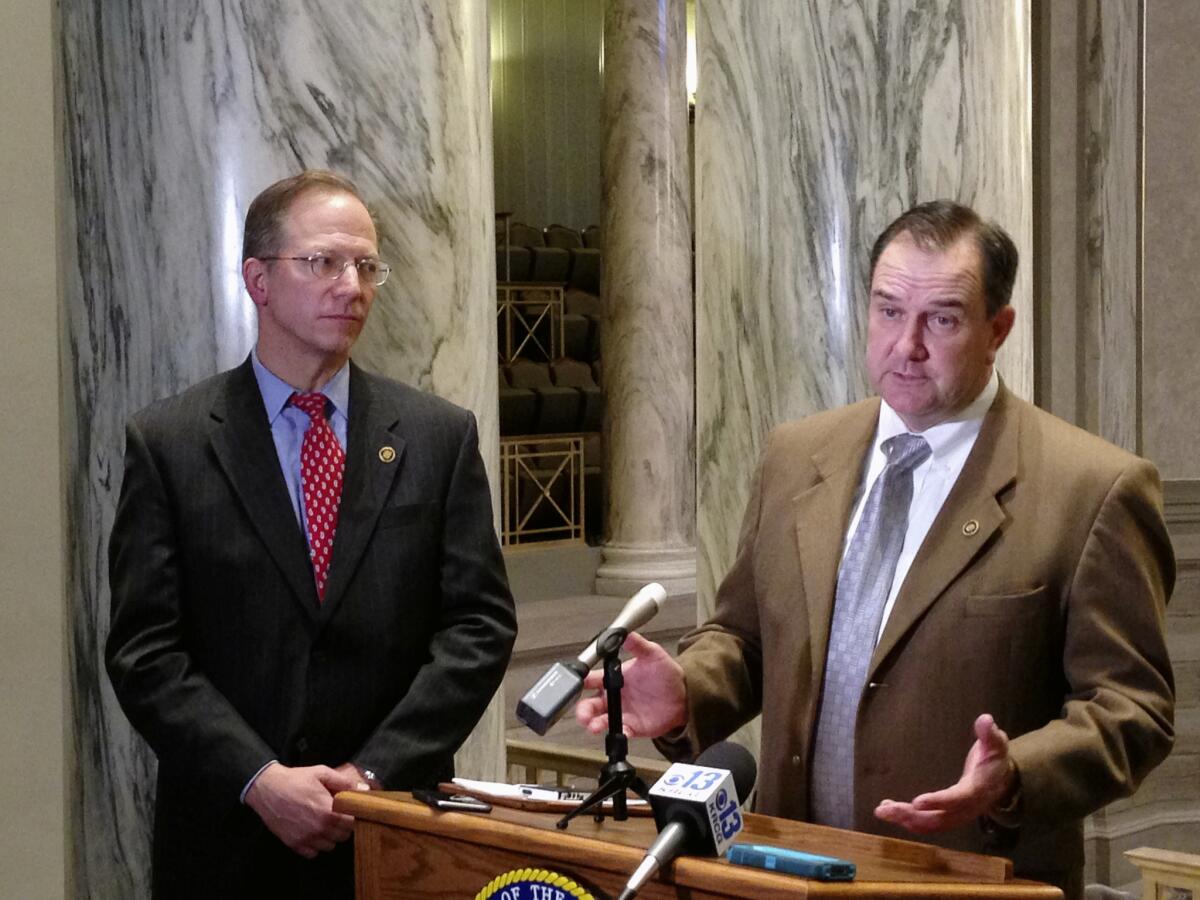Missouri GOP defeats 39-hour filibuster to pass bill criticized as anti-gay

Republican Missouri state Sens. Bob Onder, left, and Mike Kehoe at the state Capitol in Jefferson City on March 9.
- Share via
A 39-hour filibuster by Democratic Missouri state senators ended with a power play Wednesday morning as Republicans unilaterally seized control of the debate and passed a bill that LGBT advocates and business leaders had criticized as anti-gay.
Missouri’s Legislature now faces the possibility of a months-long shutdown in its upper chamber over a potentially wide-ranging “religious beliefs” constitutional amendment that opponents say could allow businesses to deny services to gay and lesbian couples.
The Republicans’ brute-force procedural move infuriated Senate Democrats, whose filibuster drew support from Democratic presidential candidates Hillary Clinton and Bernie Sanders as well as national LGBT organizations and corporate giants Monsanto and Dow Chemical.
“The Republicans exercised the nuclear option,” Sen. Scott Sifton, a Democrat who represents south St. Louis County, said in a telephone interview. “We’re talking about legislation to effectively legalize discrimination against same-sex couples, and in 2016 that’s just not the signal Democrats believe Missouri should be sending.”
The constitutional amendment is part of a national wave of conservative legislation that has been introduced around the country to protect religious business owners after the U.S. Supreme Court ruled in 2015 that same-sex marriage bans were unconstitutional.
Proponents of Senate Joint Resolution 39, who seek to place it on the November ballot, say the legislation is necessary to protect religious business owners and organizations.
The legislation would bar the state from penalizing any religious organization -- including churches, corporations, schools and hospitals and their employees -- “on the basis that the organization believes or acts in accordance with a sincere religious belief concerning marriage between two persons of the same sex.”
“SJR 39 stands for the proposition that, in our pluralistic society, we should have room to respect the religious freedom of Missourians,” said the bill’s Republican sponsor, Sen. Bob Onder.
Critics say its language would make it one of the broadest such measures in the country and could lead to unintended consequences and litigation.
“Both sides care about religious freedom, and that’s why we’re happy it’s already protected under the 1st Amendment of the Constitution” and under state law, said Steph Perkins, executive director of Promo, a Missouri LGBT advocacy organization.
The proposed measure, however, expands the role of religion in potentially denying services “in a really damaging way,” Perkins said.
Support poured in as the group of seven Senate Democrats began filibustering Monday afternoon. They worked in shifts and traded off to go shower or sleep, then returned to fill the time with everything from criticism of the bill to discussion of movies, caffeine and karate.
The showdown even drew the attention of top presidential candidates.
“Marriage equality is the law. I stand with those filibustering in MO to make sure discrimination won’t be,” Hillary Clinton tweeted Tuesday.
“Standing up for our LGBTQ sisters and brothers is the duty of all elected officials. This should make us all proud,” Bernie Sanders tweeted.
Republican presidential candidate Ted Cruz echoed Missourian Republicans’ criticism of the Senate Democrats as obstructionists.
“Missouri: Remember in November the Democrats who filibustered over 30 hours to fight against religious liberty,” Cruz tweeted, adding the hashtag #DefendReligiousLiberty.
On Wednesday morning, the state’s Senate Republican supermajority used an arcane and rarely used legislative maneuver -- called a “previous question” motion -- to end the Democratic filibuster and pass the bill.
Senate Democrats have not yet decided how to respond, but more obstruction seems likely before the legislative session ends in May.
“I’m sorry, but that kind of unilateralism is very unusual in the Missouri Senate and toxic to the atmosphere in Jefferson City,” Sifton said. “Historically, there has been full-spectrum procedural retaliation when a ‘previous question’ motion is used on a partisan issue, and I think it’s fair to say that is going to be seriously considered.”
If Republicans hadn’t moved to stop the filibuster, Sifton said, “we’d still be talking.”
Follow @MattDPearce for national news.
More to Read
Sign up for Essential California
The most important California stories and recommendations in your inbox every morning.
You may occasionally receive promotional content from the Los Angeles Times.











